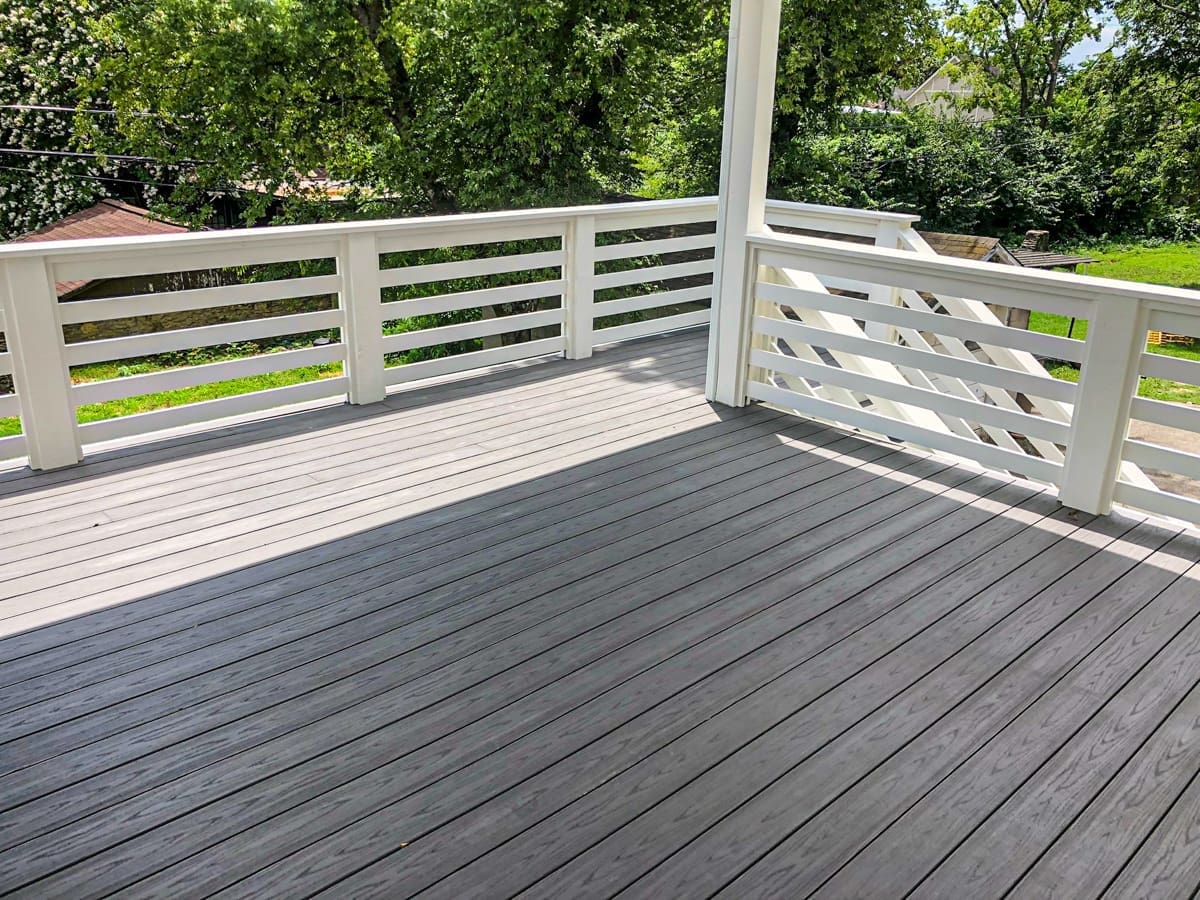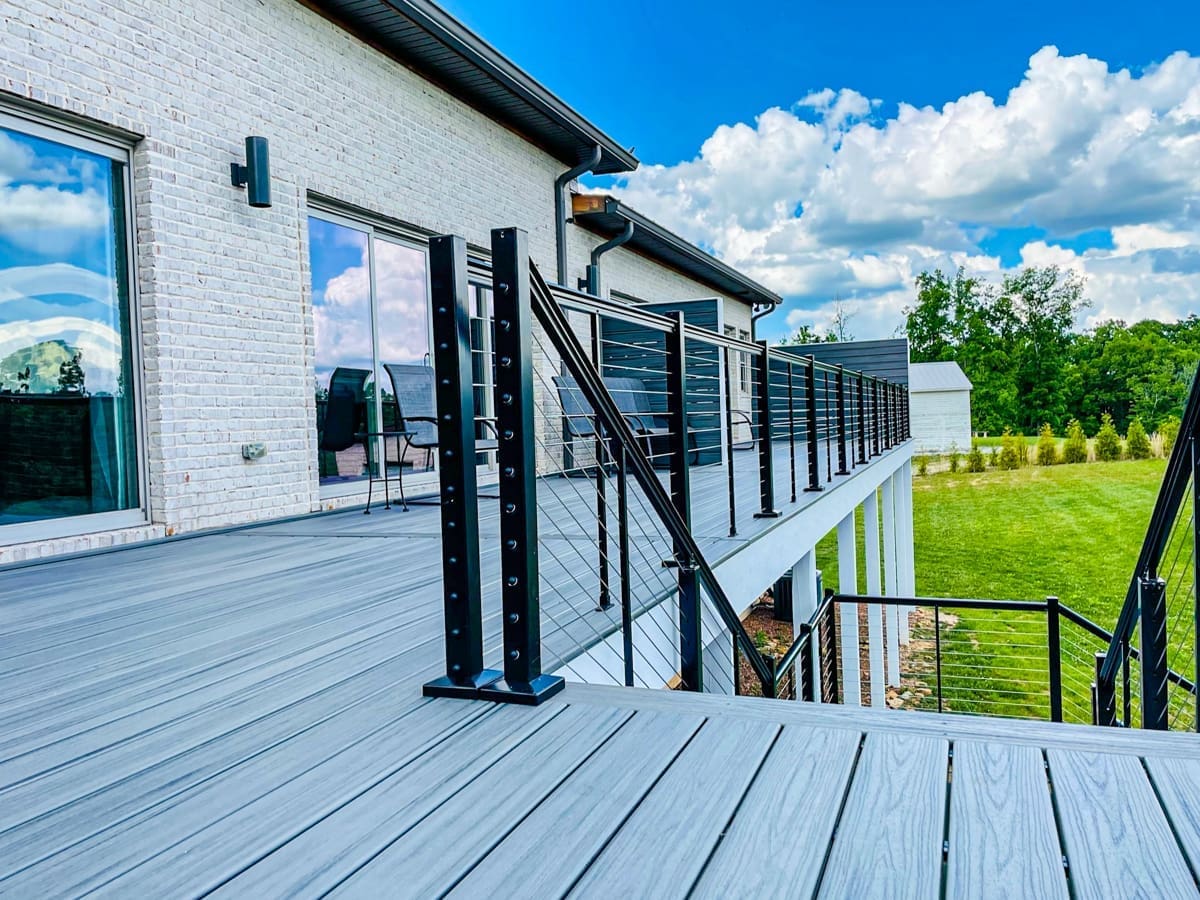Frequently Asked Questions
How long does Trex decking last compared to pressure treated wood?
Trex decking typically lasts 25 to 30 years, significantly outlasting pressure-treated wood, which generally lasts around 10 to 15 years with proper maintenance. This durability makes Trex a more long-term investment for your decking needs.
What is the difference between Trex and wood deck durability?
The difference between Trex and wood deck durability is significant. Trex composite decking is highly resistant to fading, staining, and rotting, while pressure-treated wood requires regular maintenance and is more susceptible to weather damage and insect infestations.
Is Trex or wood better for outdoor decking?
The comparison between Trex and wood for outdoor decking reveals that Trex offers greater durability and lower maintenance, while wood provides a classic aesthetic but requires more upkeep. Ultimately, the choice depends on your priorities and budget.
Does Trex decking require more maintenance than pressure treated wood?
Trex decking requires less maintenance than pressure-treated wood. While pressure-treated wood needs regular sealing and staining, Trex is designed to resist fading and staining, making it a low-maintenance option for homeowners.
Which is more expensive, Trex or wood deck materials?
Trex composite decking is generally more expensive than traditional pressure-treated wood materials. While the initial investment for Trex is higher, it often proves cost-effective over time due to lower maintenance and increased durability.
How do Trex decking and pressure treated wood handle extreme weather?
Trex decking and pressure-treated wood both handle extreme weather differently. Trex is designed to resist fading, warping, and moisture damage, making it ideal for harsh conditions. In contrast, pressure-treated wood may require more maintenance and is susceptible to weather-related wear over time.
Is pressure treated wood more prone to rot than Trex decking?
Pressure-treated wood is indeed more prone to rot compared to Trex decking. While pressure-treated wood is treated to resist decay, it can still be susceptible to moisture and environmental factors, whereas Trex decking is designed to be highly resistant to rot and weathering.
Are Trex decks more expensive than wood decks?
Trex decks generally have a higher upfront cost compared to traditional wood decks. However, their long-term savings on maintenance and durability often make them a more economical choice over time.
Do Trex decks require more upkeep than wood decks?
Trex decks require less upkeep than wood decks. Unlike wood, which needs regular staining and sealing, Trex composite decking is designed to resist fading, staining, and mold, making it a low-maintenance option for homeowners.
How long do Trex decks last versus wood decks?
Trex decks typically last 25 to 30 years, significantly outlasting traditional wood decks, which generally last around 10 to 15 years with proper maintenance. This durability makes Trex a long-term investment for homeowners.
Is Trex decking more durable than pressure treated wood?
Trex decking is more durable than pressure-treated wood. It resists fading, staining, and mold, while also being less prone to warping and splintering, making it a long-lasting choice for outdoor structures.
What is the difference between Trex decking and pressure treated wood?
The difference between Trex decking and pressure-treated wood lies in their materials and maintenance. Trex is a composite that requires less upkeep and is more resistant to weathering, while pressure-treated wood is natural, often needing regular sealing and maintenance to prevent rot and pests.
Is Trex decking more resistant to rot than wood decking?
Trex decking is more resistant to rot than wood decking. Unlike traditional wood, Trex is made from a composite material that resists moisture, preventing decay and extending the lifespan of your outdoor structures.
Can Trex decking be used in high-moisture areas like pressure treated wood?
Trex decking can be used in high-moisture areas, similar to pressure-treated wood. Its composite material is resistant to moisture, mold, and rot, making it an excellent choice for wet environments.
Which is better for outdoor use, Trex or pressure treated wood?
The comparison of Trex and pressure-treated wood for outdoor use reveals that Trex generally outperforms pressure-treated wood in durability, maintenance, and resistance to weathering, making it a superior choice for long-lasting outdoor structures.
How do Trex decking and pressure treated wood compare in cost?
The cost comparison between Trex decking and pressure-treated wood reveals that Trex is generally more expensive upfront, but its durability and low maintenance can lead to long-term savings, while pressure-treated wood offers a lower initial cost but may require more upkeep over time.
How do Trex and wood decks compare in terms of maintenance?
Trex and wood decks differ significantly in maintenance requirements. Trex composite decking requires minimal upkeep, needing only occasional cleaning, while pressure-treated wood demands regular sealing, staining, and inspections to prevent rot and insect damage.
How do Trex and wood decks withstand harsh weather conditions?
Trex and wood decks differ in their ability to withstand harsh weather conditions. Trex composite decking is highly resistant to moisture, rot, and fading, making it ideal for extreme climates. In contrast, pressure-treated wood requires regular maintenance to prevent warping and deterioration.
Are Trex decks more resistant to insect damage than wood?
Trex decks are more resistant to insect damage than wood. Unlike traditional wood, Trex composite decking is engineered to repel pests, making it a durable choice that requires less maintenance and reduces the risk of damage from insects.
What is the maintenance cost of Trex decks versus wood decks?
The maintenance cost of Trex decks compared to wood decks is significantly lower. Trex requires minimal upkeep, typically only needing occasional cleaning, while wood decks need regular sealing, staining, and repairs, leading to higher long-term expenses.
What is the durability of Trex decks compared to wood decks?
The durability of Trex decks surpasses that of wood decks. Trex is resistant to fading, staining, and mold, while wood requires regular maintenance and is prone to rotting and insect damage, making Trex a more long-lasting option.
How does Trex decking perform in humid climates?
Trex decking performs exceptionally well in humid climates. Its composite material is resistant to moisture, mold, and mildew, ensuring longevity and minimal maintenance, making it an ideal choice for homeowners in humid areas.
What are the color options for Trex decking?
The color options for Trex decking include a wide range of hues, such as rich browns, deep grays, and vibrant reds, allowing homeowners to choose from various shades that complement their outdoor aesthetics.
Can Trex decking be installed over concrete?
Trex decking can be installed over concrete. However, it's essential to create a proper framework to ensure adequate drainage and ventilation, promoting the longevity of the decking.
How does Trex decking resist fading over time?
Trex decking resists fading over time due to its advanced color technology and protective shell that shields it from UV rays and harsh weather, ensuring long-lasting color retention and minimal maintenance compared to traditional wood decking.
What are the environmental benefits of Trex decking?
The environmental benefits of Trex decking include its use of recycled materials, which reduces waste in landfills, and its durability, which minimizes the need for replacement. Additionally, Trex decking is low-maintenance, eliminating the need for harmful chemical treatments.
How does Trex decking compare in weight to wood?
Trex decking is generally lighter than traditional pressure-treated wood. This reduced weight can make handling and installation easier, while still providing durability and strength for your outdoor projects.
What warranty options are available for Trex decking?
The warranty options available for Trex decking include a 25-year limited residential warranty and a 10-year limited commercial warranty, covering defects in materials and workmanship, ensuring long-lasting quality for your outdoor projects.
How does Trex decking handle heavy foot traffic?
Trex decking is designed to withstand heavy foot traffic due to its durable, high-performance composite materials that resist scratches, stains, and fading. This makes it an excellent choice for busy outdoor spaces.
What are the installation requirements for Trex decking?
The installation requirements for Trex decking include a proper framing structure, appropriate spacing between boards, and the use of specific fasteners designed for composite materials. It's essential to follow Trex's guidelines to ensure durability and performance.
 Cost-Effective: Pressure-treated wood is generally more affordable upfront, making it a popular choice for budget-conscious homeowners.
Cost-Effective: Pressure-treated wood is generally more affordable upfront, making it a popular choice for budget-conscious homeowners. Low Maintenance: Trex composite decking is resistant to rot, mold, and insects, meaning it doesn’t need staining or sealing. A simple cleaning is all it takes to keep it looking new.
Low Maintenance: Trex composite decking is resistant to rot, mold, and insects, meaning it doesn’t need staining or sealing. A simple cleaning is all it takes to keep it looking new.



